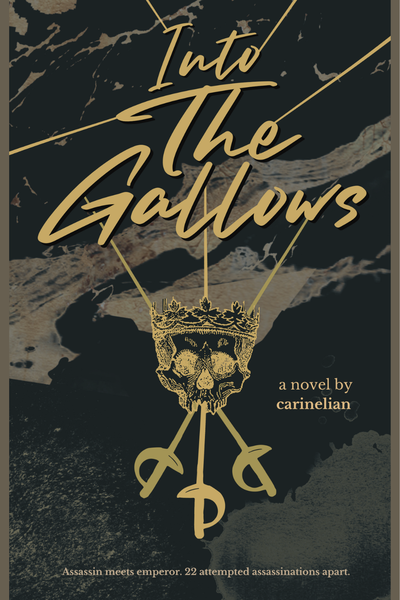“They sent him there to die, they sent me with him to watch as it happens. That was the difference.”
-Unabridged journals of the Imperial Scribe; c.23 p.191
It was love at first death sentence.
Perhaps it was a stretch to call it that, or downright delusional, but there was something akin to love on that fateful day where the emperor met his own assailant. It would have been his assassin too, if only the man was a heartbeat quicker and notched his arrow in that split-second the emperor had moved to set down his wine glass. Love was not a common word associated with publicised attempts at assassination, nor is it the first word that comes to mind when one receives a lifetime’s worth of damnation.
And yet, courtiers and common folk alike had seen it. Later on, scholars and painters would attempt to immortalise this scene: the Great Emperor Sibylla, for all his cruelty and mystery, had smiled through his crescent mask – all because of an assassin’s failed attempt to put him to the ground.
“I’m starting to think that shot may be intentional,” the emperor’s voice boomed throughout the hall, silencing murmurs from the crowd. “Were you aiming for my cup?”
The nobles inside the court exchanged looks; rarely did His Highness jest, especially in front of an audience. Everyone’s gaze then fell on the man who lay face-down on the floor, with a foot on his back and spears pointed at every critical artery in his body. One had already pierced his leg, staining the marble tiles. Ten swords pinned down one man; which served as a testament to his strength rathen than that of the court.
An assassin that should be dead by now.
An assassin that, for some reason, received the grace of the Emperor’s attention, when everyone in this room had spent years trying to do the same.
“It was meant for your heart,” the assassin choked out.
“Insolence!” The nearest guard knocked him with the hilt of his sword. More blood sprayed on the floor, causing the noblemen to gasp. Still, the Emperor remained unfazed – he even stepped down the dais and got close enough for his silk robes to absorb some of the blood.
The assassin grinned through bloodied teeth, “Sorry I missed.”
The guard raised his sword for another hit, only to be stopped by a single, cutting gaze from the Emperor.
Perhaps it was because the assassin genuinely looked apologetic, or the Emperor had felt bad ruining his beautiful face – versions of this part varied.
But one thing remained consistent:
“You should be sorry,” the Emperor agreed. “Twenty-two attempts and not once have you nicked a single vein or artery. And you call yourself an assassin? You’d be beheaded if you actually succeeded, but even that remains out of the option given these lacklustre attempts.”
Exasperation made the Emperor’s untouchable, almost doll-like features come alive, finally giving the slightest bit of personality to the usually aloof and detached monarch. All of a sudden, there was a man underneath the silk robes, made of flesh and blood. There was a face underneath that half-mask – one that framed reddish-brown eyes and plump lips.
At that moment, as he sentenced the assassin to his fate, Emperor Sibylla had become a person.
“You will die,” he said to the man, “but never before me. You will be sent to the Fortress of Serberos, down the coldest cells, where you can spend your remaining days wondering where you went wrong.”
“Whoever sent you to kill me is welcome to try and rescue you – if you can make it out alive. You can try breaking out, but let it be known that only dead men walk out of the fortress. And if by chance you can make a dead man walk, please feel free to make a twenty-third attempt. I’m quite looking forward to the other creative ways you can take my life.”
The Hall of Fortunata fell silent under the mockery and implication of those words. Perhaps, on paper, it would look as if the Emperor was hammering the final nail onto the assassin’s coffin by dangling a sense of false hope. Technically speaking, the assassin could walk free provided that he makes a successful break out of prison. He was even permitted to try and finish the job, provided that he was creative.
It was the ultimate clemency and damnation. It eluded the empire, given that this was the man who usurped the throne and had his predecessor’s head tied to a stake. This was the man who purged the court and offered traitors to the wolves – literally – as he believed that ‘it is never too late for kin to reunite’.
This was the man who both saved and seized the empire of Ambros by the neck. He was said to have survived the catastrophic war at the borderlands, eliminated any other candidate to the throne by wit and cunning, and made the empire the powerhouse it is today. An unfeeling madman in a crescent mask.
In other versions of the story, some locals had theorised that Emperor Sibylla once hired this assassin to do his dirty work, and now that he had become Emperor, the assassin had come hounding him for fortune. Some scholars said that it was staged – another tactic by the Emperor to humanise himself.
But only the guards will tell you, and perhaps the executioner himself, that when Emperor Sibylla faced the gallows – his last words had been for a man condemned in Seberos’ coldest cells.
Don’t tell him about me.











![[PROLOGUE] Love at first death sentence](https://us-a.tapas.io/sa/bf/e9574abd-9fa9-4bc7-8eda-0bf5e29271c8.jpg)
Comments (1)
See all